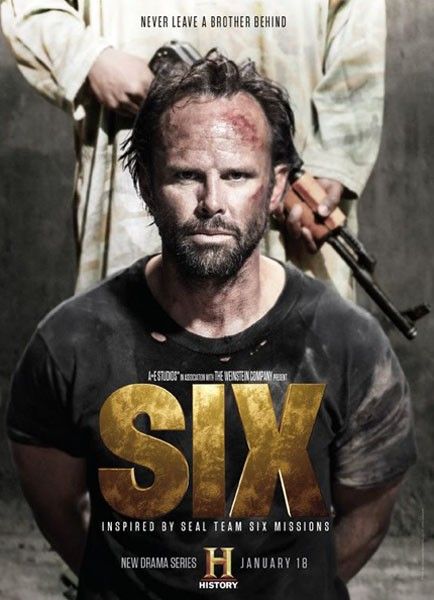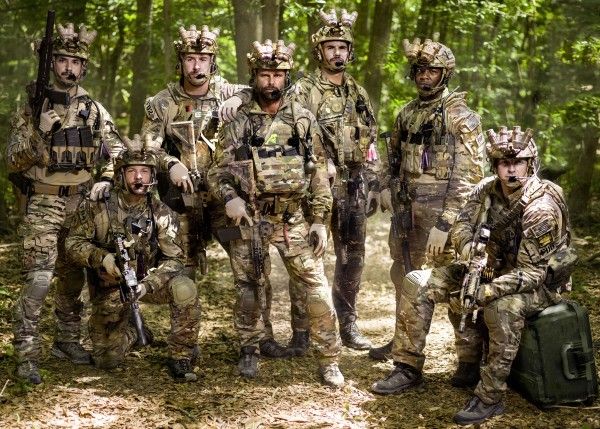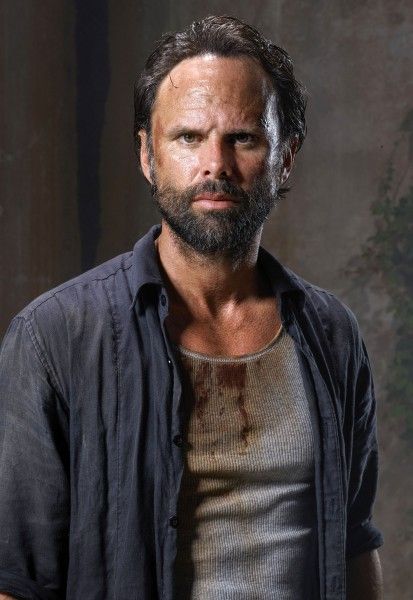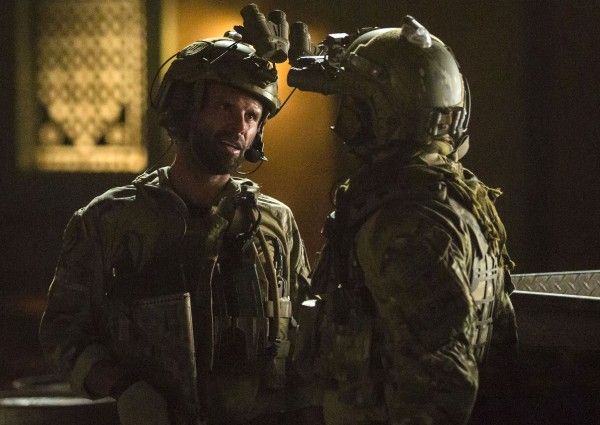Walton Goggins is one of those actors whose projects I will always check out because he always brings something interesting, compelling and unexpected to every role that he plays, whether protagonist or antagonist. He’s also one of those human beings who I will always take the time to chat with about anything that he’s got going on in his career because he does so thoughtfully and with great passion for his craft.
During this recent interview, we chatted about his role as a Navy SEAL in the History Channel series Six, which is a grueling and brutal journey for his character, Rip Taggart, a commanding leader, brilliant solider and member of SEAL Team Six, who is captured and tortured in Nigeria, not knowing whether he’ll ever make it out alive. For the production, he got to chat with a real-life Navy SEAL that helped inform his performance, and the shoot itself was the hardest thing he ever had to experience, physically. He also talked about what got him excited about the upcoming Tomb Raider film, for which he’s playing the antagonist, and why he wanted to work with Alicia Vikander.
Collider: You really get your ass kicked in this!
WALTON GOGGINS: Yeah. It was a lot to be incarcerated for 14 hours a day, with your arms bound and your feet bound. I’m sure someone will do a YouTube of how many times Rip Taggart was hit. It was tough, mentally. I had a cappuccino at the beginning of the day and the middle of the day, and a beer at the end of the day, but you feel just a portion of the pain that people have gone through, in those circumstances. What an incredible experience. It was a real cathartic journey.
How did you read this script, see what it would put you through, and then say, “Yes, sign me up for that!”?
GOGGINS: I didn’t. I replaced Joe [Manganiello]. When Joe fell out, they said, “Let’s go to Walton.” I had a long conversation with them about it and, for me, I felt like I had an opportunity to really honor the struggle of men and women in our armed services, in a way that wasn’t political and it wasn’t about America. It was about the individual, and I think that that’s been neglected in the conversation. It was also a chance to have what has taken me upwards of six and seven years (with Justified and The Shield), respectively, that kind of a journey in eight episodes.
Whenever you hear stories about SEAL teams and their missions, you feel a sense of appreciation for what they do, but it’s hard to fully grasp what a job like that puts you through, physically and mentally. What most helped you in grasping just what being a SEAL really entails?
GOGGINS: Mitchell Hall was our tech advisor on Six. It was not with him, but I had a long conversation with a Navy SEAL, on my own, and he became a very good friend of mine. I noticed his behavior, early on, and something he was doing to compensate was curious to me. I had an opportunity to talk to him and he said, “You can ask me anything you want.” I said, “I’m only going to ask you one question, and either you’ll answer me honestly or you won’t. And if you don’t answer honestly, I completely understand and I really don’t have anything else to say. But if you do answer honestly, I have a feeling that you and I are going to be here drinking whiskey for a long time, and we’re really going to get into it.” I asked him the question and he answered me honestly, and then the conversation began. He let me see behind his curtain. He let me touch his humanity and experience how his humanity was affected by everything that he saw and that was asked of him. He’s an incredible human being. Most of us will never, ever experience the decisions they have to make in one day of their lives, let alone every moment of every day, and that affects everything around them.
These men and women in our armed services are expected to perform, both mentally and physically, in an arena of war, and also pay their cable bill and their house payment. I don’t understand how those two realities exist in the same space. It’s hard for me, and I’m just a storyteller. It’s hard for a guy or a woman who works from 9 to 5, every day, and certainly it’s much more difficult when you’re in these situations and you’re asked to fight for your country. I felt that it was very important to honor that struggle, in a way that took it out of politics and the flag and the message of your country. I wanted to just honor the individual, and I’m really proud of it.
When you see where this goes and you see this existential journey and you see this stalwart walk from this man who genuinely doesn’t want to deal with anything and who is forced to deal with all of it, and what he learns on the other side of that journey and what he learns along the way and what he teaches people along the way, it was special. I hope there’s a returning service man or woman that is able to see it and say, “You know what? That fucking guy cares about me. Those showrunners care about me. Those other actors on that show and the guy behind the camera and that director care about me.” That’s a good thing.
Obviously, you know you’re filming and that you can go home or to a nice hotel room, once you’re done for the day, but there are people who are captured and tortured, who hopefully can find a way to survive it somehow. Did all of it weigh on you, right from the beginning, or did you get through the shoot before really feeling what you had gone through?
GOGGINS: It was tough. You can have a glass of wine or a shot of whiskey and transition back into your civilian life, but I had about four days notice before I jumped on board, so for me, the first three weeks or a month, I worked every single day, and I’m grateful for it because I didn’t really have a chance to think about anything. I just reacted. When you’re living in that space, you want to honor these men and women. It’s not a fucking vacation. I’m there for a reason, and I got a lot out of it. It was the hardest thing I’ve ever done, physically. I don’t know that anything I’ve ever done compares to the relentless aspect of that mental and physical incarceration, and I went straight from doing that to doing a movie about schizophrenia. After that, I took four months off, and that felt really, really good. I was exhausted. I think all the boys would say that, and I think their wives would say that.
The idea of a Tomb Raider reboot became interesting when Alicia Vikander was cast as Lara Croft, but it became even more interesting when you were announced as the villain. What was it about this telling of the Tomb Raider story that spoke to you?
GOGGINS: I’m just so excited about it! I’m such a big fan of Alicia and this director, Roar [Uthaug]. Quite honestly, the script feels like it’s already been in the world, in some ways. The structure and the foundation of this story is so solid and so interesting. It’s so unbelievably entertaining, and yet it’s real in the journey that it takes you on. And this person that I get to play is confused and angry and desperate. I’m just looking forward to getting in his head. I’m really, really, really excited about it.
When you play antagonists that are so memorable that they’re thought of alongside the story’s protagonist when people think of that particular TV show or movie, does it give you pause when the next one comes up?
GOGGINS: Yeah, I suppose. On one level, I think about it in those terms. In another way, I just go where the work is and where people are extremely passionate about telling their story and where they’re capable filmmakers, no matter how long they’ve been doing it. It’s about whether they understand what it is that they’re asking themselves to do and whether they really want to say something. That’s always been my motivation. This thing that I did after Six, Three Christs, I don’t know if there’s an antagonist in the bunch. Maybe schizophrenia is the antagonist, or maybe it’s how we view those that aren’t like ourselves. Maybe that’s the antagonist. It was just an incredible opportunity. And Tomb Raider is an incredible opportunity. People have only seen the first season of Vice Principals, but when you see where the show goes, there’s so much more than whether or not those are bad guys. That’s what I’m interested in playing, regardless of what side he’s on. I’ve had some opportunities lately to play the hero, and they just haven’t been about the right thing. They haven’t spoken to me, in that way. But Six certainly did, and Three Christs did, and lord knows that Tomb Raider did.
When Tomb Raider came your way, was it the script that sold you on it, or did you also wanted to talk to director Roar Uthaug first?
GOGGINS: It was threefold, to be quite honest with you. I think Alicia is one of the greatest actors of any generation, let alone her own. And I saw Roar’s movie The Wave last year, and I wanted to meet that filmmaker. And then, it was the script. It always starts with the story for me. I couldn’t believe I was reading what I was reading. I couldn’t believe that it continued in this way, and the ball was never really dropped. It was the combination of those three things. I understand why Alicia signed on for it. Those things don’t happen every day. And then, you go forward and you just try not to be result-oriented and you try to do the best job you can possibly do, before you move on to the next one. It’s a good life! I’m just grateful to be a small part of that life.
Six premieres on the History Channel on January 18th.





